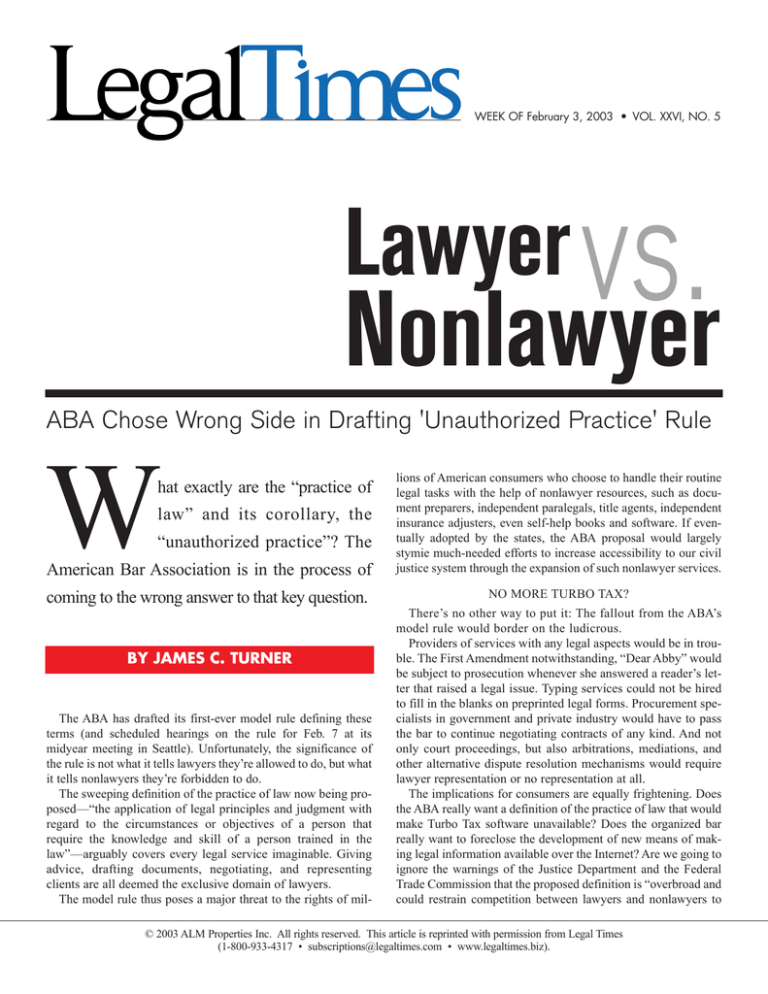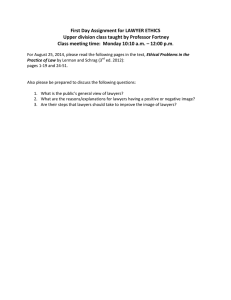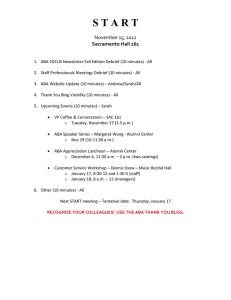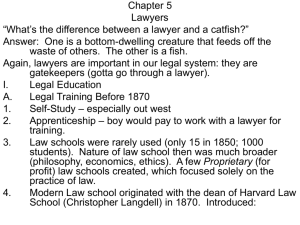
WEEK OF February 3, 2003 • VOL. XXVI, NO. 5
vs
.
Nonlawyer
Lawyer
ABA Chose Wrong Side in Drafting 'Unauthorized Practice' Rule
W
hat exactly are the “practice of
law” and its corollary, the
“unauthorized practice”? The
American Bar Association is in the process of
coming to the wrong answer to that key question.
BY JAMES C. TURNER
The ABA has drafted its first-ever model rule defining these
terms (and scheduled hearings on the rule for Feb. 7 at its
midyear meeting in Seattle). Unfortunately, the significance of
the rule is not what it tells lawyers they’re allowed to do, but what
it tells nonlawyers they’re forbidden to do.
The sweeping definition of the practice of law now being proposed—“the application of legal principles and judgment with
regard to the circumstances or objectives of a person that
require the knowledge and skill of a person trained in the
law”—arguably covers every legal service imaginable. Giving
advice, drafting documents, negotiating, and representing
clients are all deemed the exclusive domain of lawyers.
The model rule thus poses a major threat to the rights of mil-
lions of American consumers who choose to handle their routine
legal tasks with the help of nonlawyer resources, such as document preparers, independent paralegals, title agents, independent
insurance adjusters, even self-help books and software. If eventually adopted by the states, the ABA proposal would largely
stymie much-needed efforts to increase accessibility to our civil
justice system through the expansion of such nonlawyer services.
NO MORE TURBO TAX?
There’s no other way to put it: The fallout from the ABA’s
model rule would border on the ludicrous.
Providers of services with any legal aspects would be in trouble. The First Amendment notwithstanding, “Dear Abby” would
be subject to prosecution whenever she answered a reader’s letter that raised a legal issue. Typing services could not be hired
to fill in the blanks on preprinted legal forms. Procurement specialists in government and private industry would have to pass
the bar to continue negotiating contracts of any kind. And not
only court proceedings, but also arbitrations, mediations, and
other alternative dispute resolution mechanisms would require
lawyer representation or no representation at all.
The implications for consumers are equally frightening. Does
the ABA really want a definition of the practice of law that would
make Turbo Tax software unavailable? Does the organized bar
really want to foreclose the development of new means of making legal information available over the Internet? Are we going to
ignore the warnings of the Justice Department and the Federal
Trade Commission that the proposed definition is “overbroad and
could restrain competition between lawyers and nonlawyers to
© 2003 ALM Properties Inc. All rights reserved. This article is reprinted with permission from Legal Times
(1-800-933-4317 • subscriptions@legaltimes.com • www.legaltimes.biz).
provide similar services to American consumers”?
Despite ABA President Alfred Carlton Jr.’s disingenuous claim
to Legal Times last week that the bar is acting to correct “a chilling effect for nonlawyers to provide allied legal services because
they are afraid they’ll be called in for unauthorized practice of
law,” the proposal does exactly the opposite. In fact, the model
rule is so broadly framed that it represents little more than a
naked attempt on the part of the organized bar to stifle competition from nonlawyer legal service providers. Responsible
lawyers should reject such sophistry out of hand.
REMOVING THE COMPETITION
The ABA proposal does not come in a vacuum. There is a
long history of state bar associations misusing unauthorizedpractice restrictions to attack perceived economic threats to
lawyer dominance over the delivery of legal services.
Oregon independent paralegal Robin Smith provided affordable document preparation services for more than 10,000
uncontested divorces without a single consumer complaint, yet
was successfully targeted by the state unauthorized-practice
committee and driven out of business.
In Delaware, disability advocate Marilyn Arons provided expert
services for families who could not afford lawyers to represent their
children in educational placement proceedings for more than a
decade. But she was so successful that lawyers for the school districts
that lost used an unauthorized-practice injunction to silence her.
In Florida, legal secretary Rosemary Furman even faced
incarceration for unauthorized practice, when her typing and
document preparation service raised the hackles of local
attorneys who did similar routine work at much higher prices.
In Virginia, despite antitrust objections registered by the FTC and
the Justice Department, real estate lawyers continue their efforts to
require attorney representation at every real estate closing.
And in Texas, the state legislature had to intervene after
unauthorized-practice vigilantes convinced a U.S. district
judge that the nation’s most popular do-it-yourself legal software, Quicken Family Lawyer, should be banned.
A LOT OF ROUTINE TASKS
As disastrous as these state practices are for the nonlawyers who
have the temerity to provide legal services, consumers are the big
losers. Rather than protecting the public, unauthorized-practice rules
have been systematically abused to curtail consumers’ options to
choose legal services that meet their needs and budgets. As a result,
according to a 1996 ABA study, some 38 million low- and moderate-income Americans are closed out of our civil justice system
because they simply cannot afford to hire a lawyer to help them.
The legal needs that go unmet fall on a wide continuum,
ranging from routine, cookie-cutter jobs—preparing a simple
will, writing a sales contract, resolving a consumer complaint—to complex transactions and adversary proceedings
where representation by counsel is indispensable. The needs
are felt by the full range of our society, from the profoundly
disadvantaged to the highly educated and sophisticated.
Ada Shen-Jaffe, the director of Columbia Legal Services in
Washington state, has described a typical client population as presenting a pyramid of legal wants that can be met by a variety of providers. Fifty percent can be served through very low-cost interventions such as self-help publications, software, videos, and cable
access television. Thirty-five percent need low-cost intervention
involving a trained nonlawyer (for example, a domestic violence
shelter worker or a legal forms preparer). Ten percent require some
help from an attorney, but the legal representation involved is lowcost and may be supplemented with paralegal or nonlawyer support.
Only 5 percent require full-range, high-cost lawyer representation
to address their more complex needs.
This is not a new insight, and reforms have been proposed
across the country to ensure the availability of nonlawyer legal
services. The state of California has gone so far as to enact legislation that authorizes legal document preparers to help fulfill
these needs. But other states have been less forward-looking.
And now the national leadership of the organized bar is
advancing a proposal that can only strengthen the stranglehold
of lawyers on the delivery of legal services, and discourage the
development of innovative and affordable alternatives to fullblown legal representation.
IN THE PUBLIC INTEREST
Perhaps the ABA has forgotten that on six occasions in the
1960s and 1970s, the Supreme Court ordered bar associations
to cease anti-competitive practices that violated the
Constitution or the Sherman Antitrust Act. Do we really want
to repeat the errors of the past?
We face a growing accessibility crisis. As reported by The
New York Times (in a Feb. 9, 2002, article), up to 90 percent of
divorce cases in some jurisdictions involve at least one party
who lacks lawyer representation. Under the ABA’s approach,
these individuals would be forced to proceed pro se with no
outside help at all. Such irrational protectionism flies in the
face of our shared responsibility to practice law in a manner
consistent with the public interest.
There is a better approach. We should limit the concept of
unauthorized practice by establishing a common-sense, brightline test that equates it to fraudulent practice—that is, saying
you’re a lawyer when you’re not. At the core of the practice of
law is a special fiduciary concept, the attorney-client relationship. Unless an individual is falsely claiming to offer this
unique service, she is not practicing law. Consumers understand this, and so should the profession.
This simple definition would go far toward eliminating the abuses of unauthorized-practice rules and would allow desperately
needed innovation. At the same time, it would not meaningfully
reduce consumer protection. Unlike lawyers, who are generally
exempt from coverage, nonlawyers are accountable under state
consumer fraud laws—a far more potent remedy than lawyer-run
unauthorized-practice proceedings. Finally, this definition would
get the bar out of the business of trying to regulate the activities of
nonlawyers—a sphere where it really doesn’t belong.
Whether the ABA likes it or not, lawyers cannot fully serve the
legal needs of the public, and nonlawyer legal providers are here to
stay. It is time to come into the 21st century and repudiate protectionist practices that hurt consumers and justifiably engender disdain for the legal profession. Junking the proposed model rule on
the practice of law would be a good first step.
James C. Turner is executive director of HALT Inc., a D.C.based nonprofit public interest organization that works to
increase accessibility to the civil justice system.




